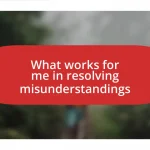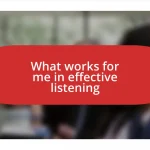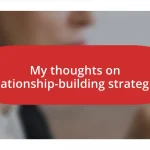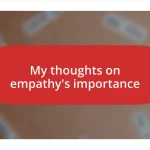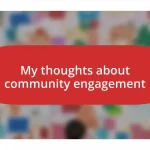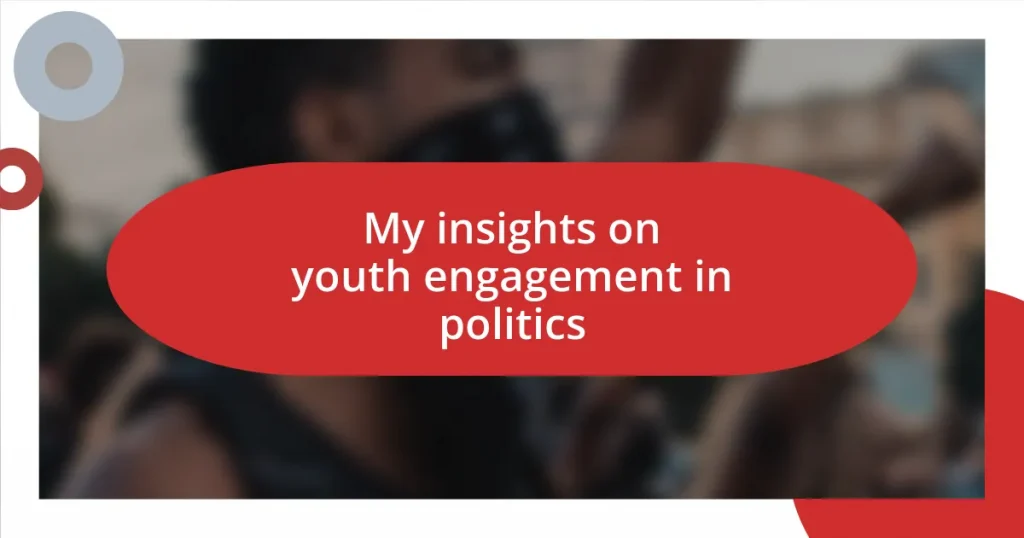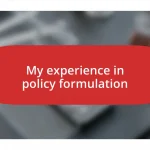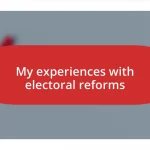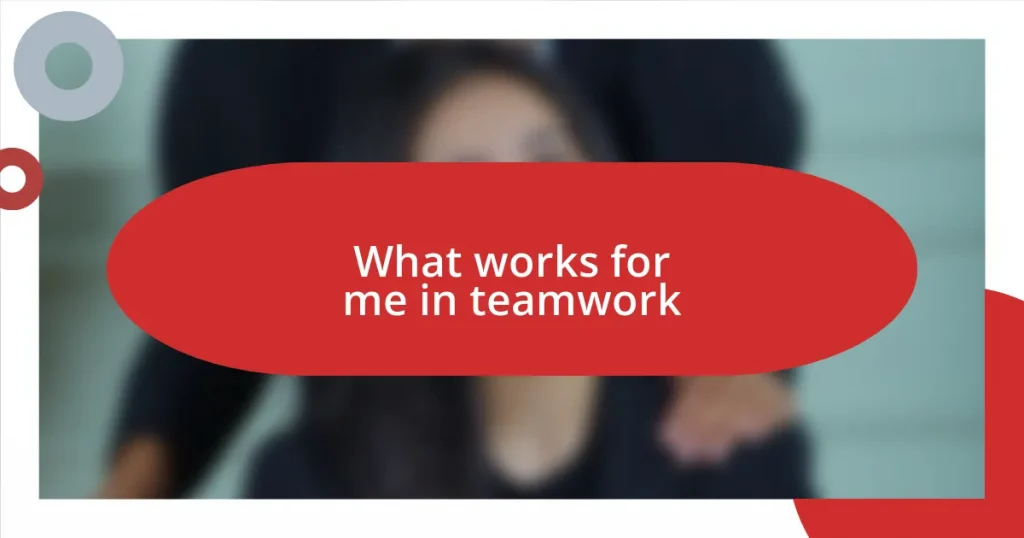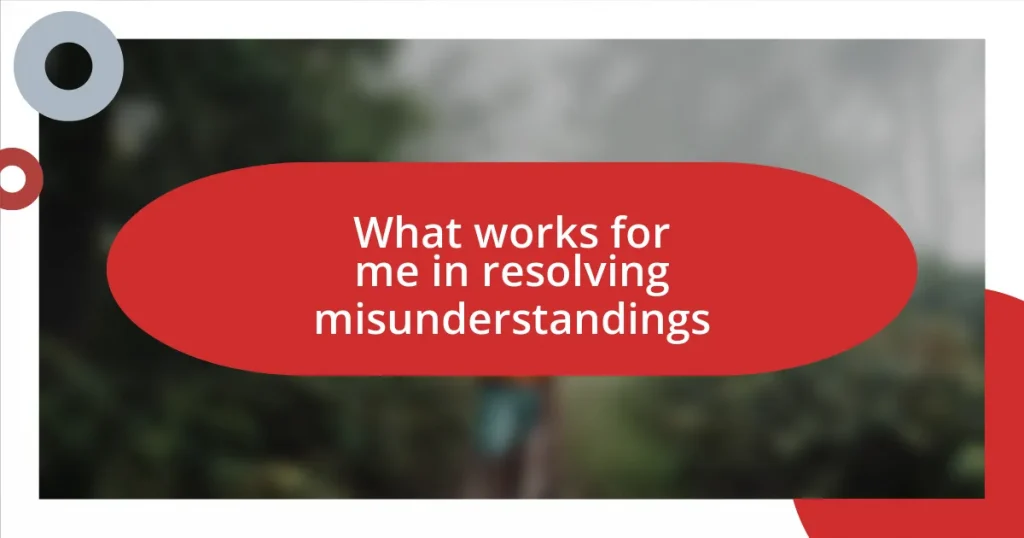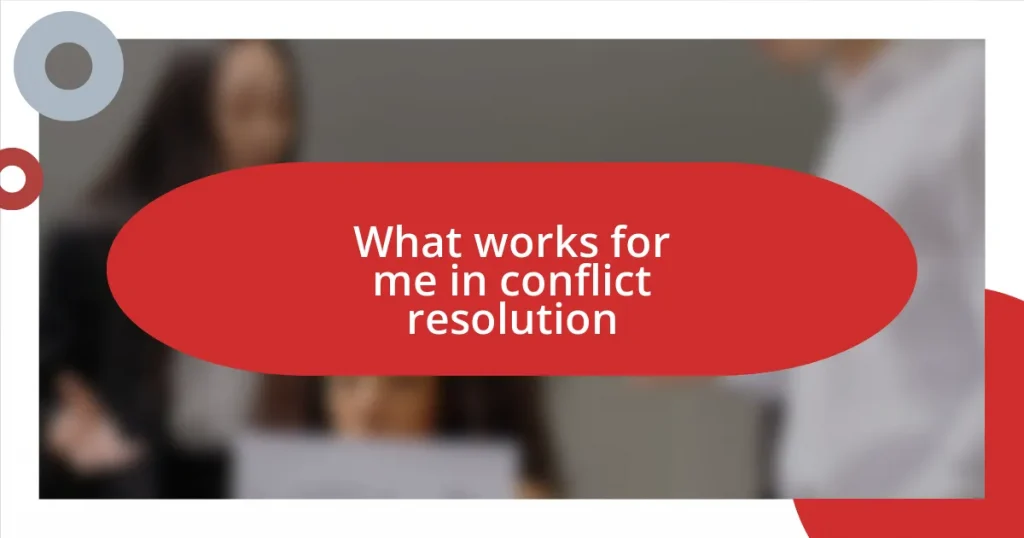Key takeaways:
- Youth political engagement is crucial for shaping future communities, bringing fresh perspectives that challenge the status quo.
- Barriers such as lack of accessible information and disillusionment with established parties hinder youth participation in politics.
- Creating accessible platforms, mentorship programs, and hands-on experiences can effectively enhance youth engagement.
- Future trends in youth engagement are likely to involve increased reliance on technology, grassroots activism, and a focus on environmental and social justice issues.
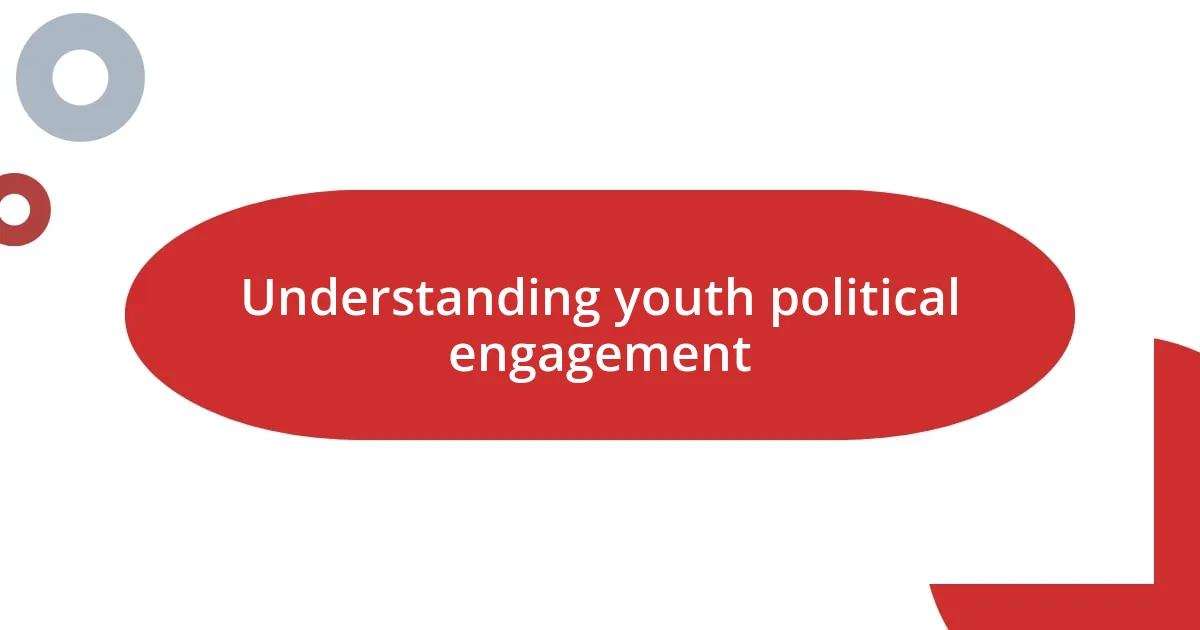
Understanding youth political engagement
Understanding youth political engagement is crucial because it shapes the future of our communities and countries. I remember my first time voting; it felt like a rite of passage. I was nervous but excited, realizing I was part of something bigger than myself. Have you ever felt that rush of empowerment when you knew your voice mattered?
When young people engage, they bring fresh perspectives that can challenge the status quo. I’ve seen this firsthand at local town hall meetings where youth voices sparked heated conversations. It struck me how different our priorities often are compared to older generations. Why is it that our concerns, like climate change and social justice, can sometimes feel sidelined?
This disconnect can be disheartening, yet it also fuels the passion of many young activists. I recall attending a rally where youth-led initiatives made their mark. The energy in the crowd was infectious, with chants echoing the hope for change. It made me wonder: what if more young people discovered the power of their voice? Engaging in politics isn’t just a choice; it’s a responsibility that can lead to real, tangible change.
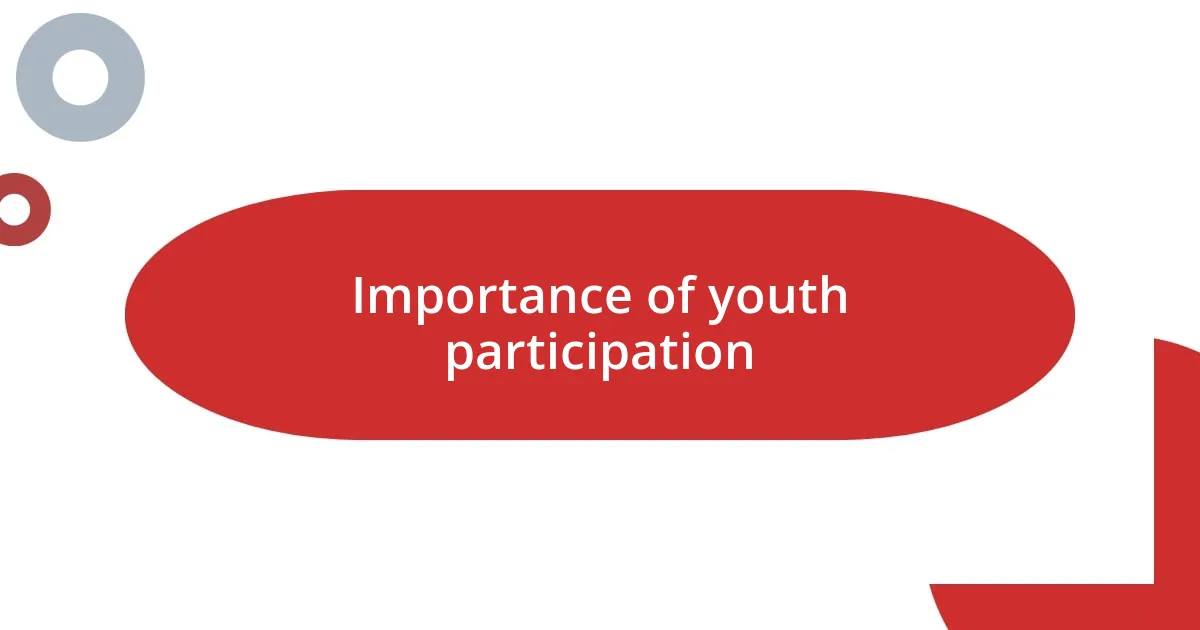
Importance of youth participation
Youth participation in politics is vital for creating inclusive and representative decision-making processes. When young individuals become involved, they not only inject energy into discussions but also challenge norms that may not reflect current societal needs. I remember volunteering for a campaign and being struck by how different our strategies were compared to traditional approaches. There, I saw firsthand how our innovative ideas reshaped dialogues and energized voter engagement.
Moreover, engaging in political activities equips young people with valuable skills and experiences that extend beyond the political realm. Skills like public speaking and critical thinking become part of their arsenal. I often reflect on how participating in debate clubs during my youth honed my ability to articulate my thoughts effectively—an essential skill that has served me in various aspects of my life. Don’t you think that having a voice in political discussions fosters a richer social fabric?
The impact of youth participation reaches far into the future, as today’s engaged young citizens become tomorrow’s leaders. I think about the friends I made while canvassing; many have become local leaders in their communities. Seeing their achievements makes me believe that sustained youth involvement is key to fostering a culture of active citizenship that can ignite change in generations to come. Isn’t it exciting to imagine what they will accomplish?
| Benefits of Youth Participation | Consequences of Inaction |
|---|---|
| Fresh Perspectives | Lack of Representation |
| Skill Development | Stunted Civic Engagement |
| Future Leadership | Perpetuation of Old Norms |
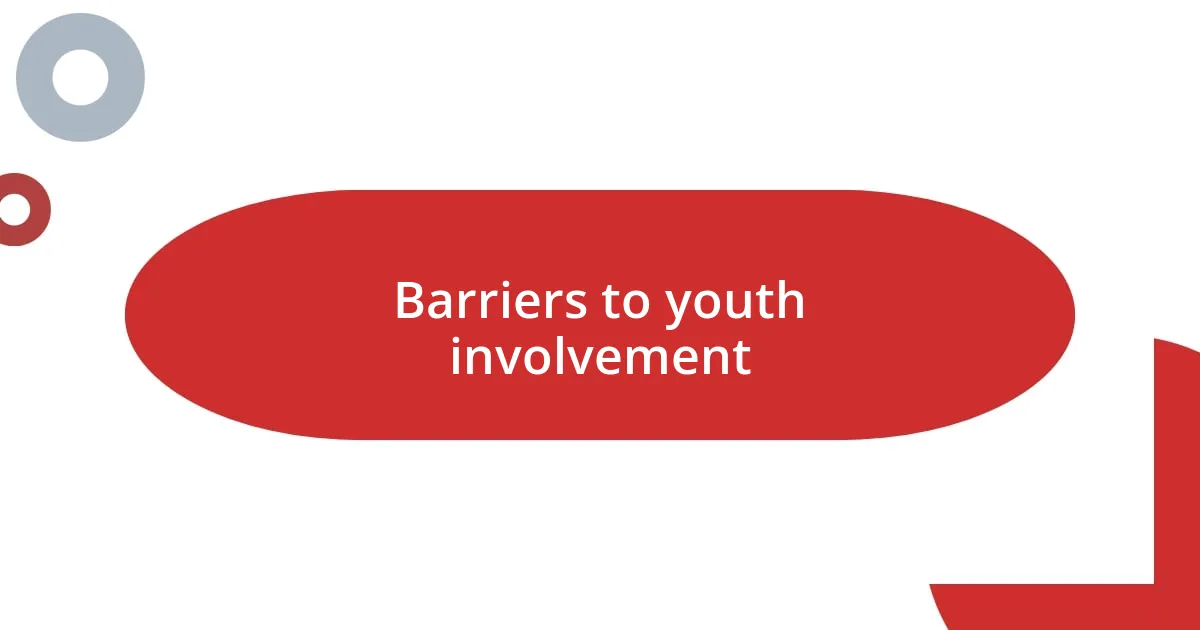
Barriers to youth involvement
Many young people face significant barriers when it comes to engaging in politics, which can be frustrating. I’ve often felt that the political jargon and complex systems can seem like an insurmountable wall. When I first tried to understand local governance, I was overwhelmed with terms and processes that felt exclusive. This sense of exclusion can leave young individuals feeling disheartened and unwilling to participate.
Here are some specific barriers that contribute to this feeling:
- Lack of accessible information: Youth often struggle to find clear and relevant political information tailored to their needs.
- Disillusionment with established parties: Many young people feel that traditional political parties do not address their concerns or represent their interests.
- Limited networks and resources: Young individuals may lack mentors or connections that can help them navigate the political landscape.
- Time constraints: Juggling education, work, and personal life can limit the time available for political involvement.
- Fear of backlash: Young people may worry about negative repercussions from peers or authority figures for expressing their political opinions.
In my experience, these barriers can feel especially daunting. I remember being hesitant to join political discussions in school clubs because I feared being dismissed due to my age. The anxiety of being judged or underestimated can create a cycle of disengagement. Recognizing these barriers is the first step toward fostering an environment where youth feel compelled to step up and make their voices heard.
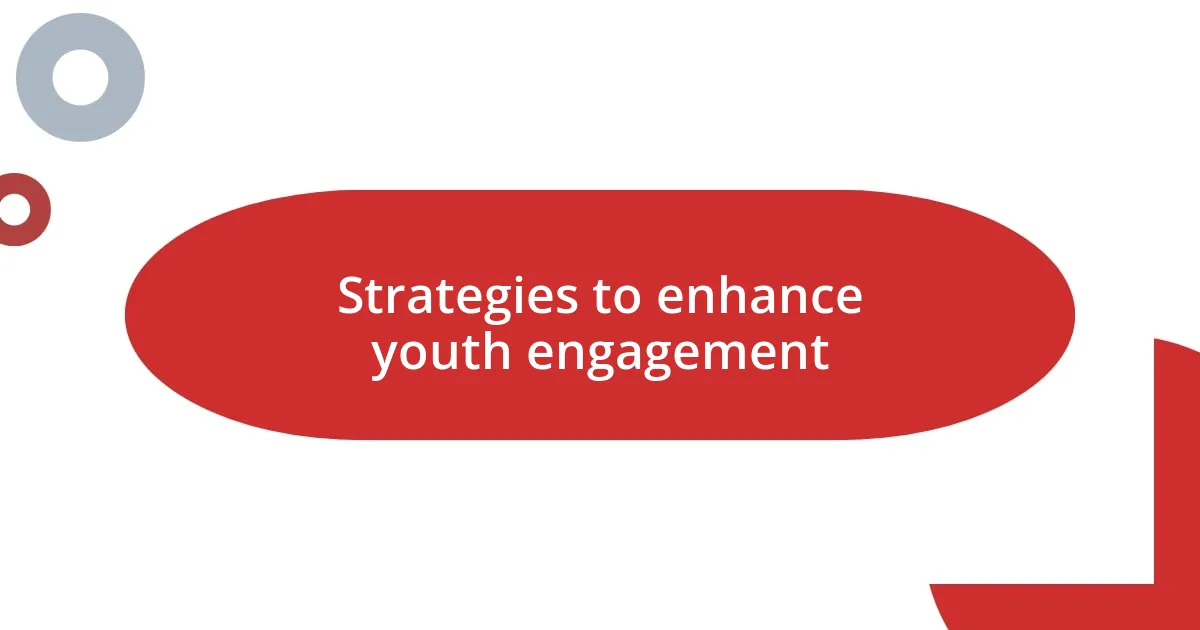
Strategies to enhance youth engagement
To enhance youth engagement in politics, creating accessible platforms is essential. Digital tools can serve as vibrant spaces for discussion and information sharing. I remember when my friends and I launched a social media campaign to discuss local issues; the conversations we sparked, often stretching into late-night chats, showed me the power of comfortable, informal environments. Have you ever thought about how open forums can break down barriers?
Another effective strategy is to empower young voices through mentorship programs. Pairing seasoned political figures with aspiring youth can foster meaningful connections and provide guidance. I still think of the time I reached out to a local council member who became a mentor; their insights on navigating political landscapes not only inspired me but also made me feel like I belonged. What if every young individual had access to that kind of support?
Engaging youth in hands-on experiences, like volunteer opportunities or internships, can ignite passion and commitment. When I interned at a community center, I witnessed firsthand how active participation in local initiatives made politics feel tangible and relevant. These experiences not only build skills but also reinforce the idea that every action, no matter how small, contributes to a larger impact. How can we ensure that more young people have access to these transformative opportunities?
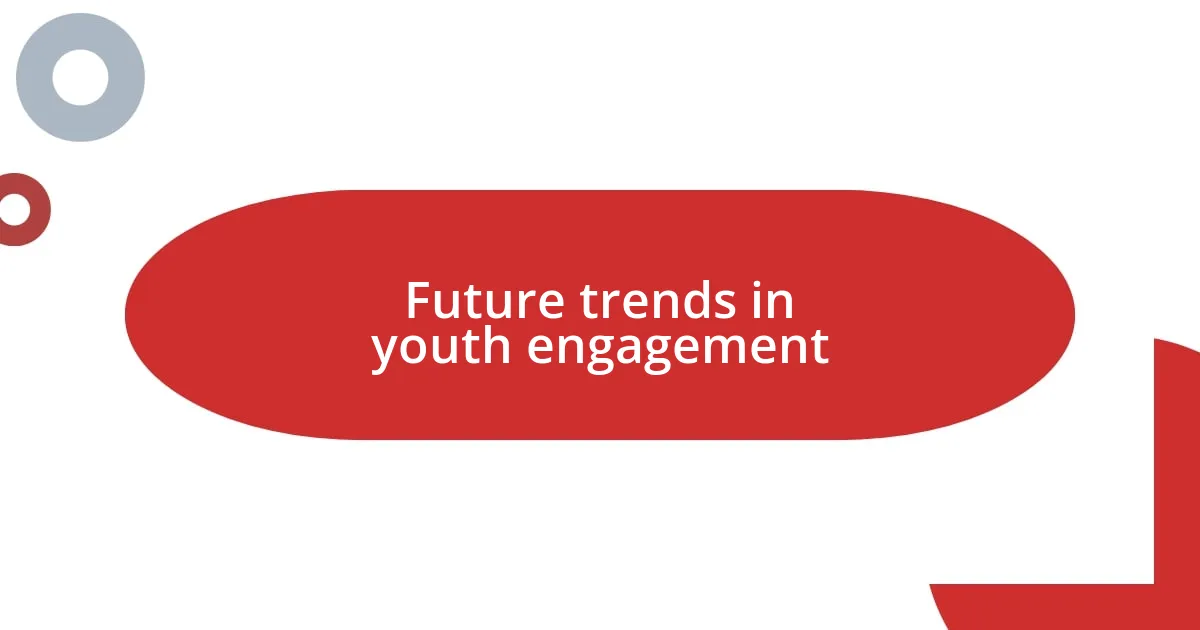
Future trends in youth engagement
The future of youth engagement in politics is poised to be shaped by a growing reliance on technology. I’ve observed a shift where online platforms are no longer just tools for information but vibrant communities where young people actively connect, discuss, and mobilize around issues. Do you remember when social media was merely a way to connect with friends? Now, it’s becoming a powerful catalyst for political engagement, allowing youth to express their views and organize movements with unprecedented speed and reach.
Moreover, I believe we’ll see a rise in grassroots activism, as more young people realize their collective strength. I recall attending a local rally organized entirely by youth; the energy was electric, and seeing peers come together to advocate for change ignited a spark in me. It felt empowering, almost as if we were rewriting the rules of engagement. What if this movement continues to grow, with local initiatives flourishing into national dialogues?
Another trend I foresee is increased emphasis on environmental and social justice issues. Many young people are deeply passionate about these topics, and this commitment could lead to new political platforms prioritizing them. I remember feeling a surge of hope when I read about youth-led climate strikes; it demonstrated that passion can translate into action. How might these emerging leaders shape policies to create a more equitable and sustainable future? As I reflect on this, I’m optimistic about the potential for lasting change driven by our youth.

